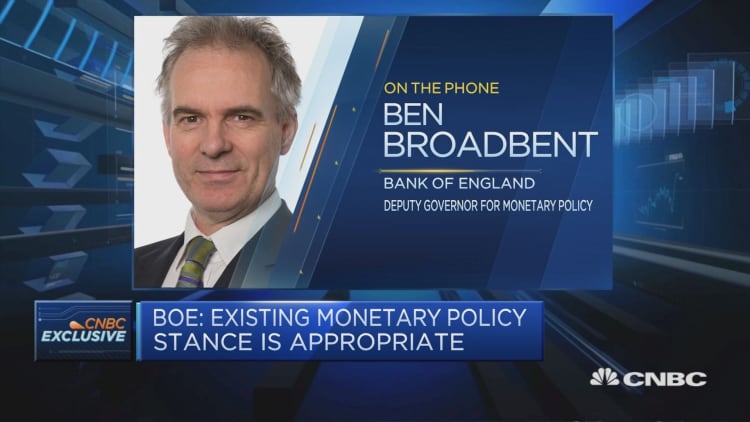It is "quite possible" that the Bank of England could implement additional easing measures in the future, according to Deputy Governor for Monetary Policy Ben Broadbent.
The BOE's Monetary Policy Committee (MPC) voted to hold interest rates at a historic low of 0.1% last Thursday, having cut rates twice from 0.75% since the start of the coronavirus pandemic.
"The committee are certainly prepared to do what is necessary to meet our remit with risks still to the downside," Broadbent told CNBC on Tuesday.
"Yes, it is quite possible that more monetary easing will be needed over time."
Along with the two previous rate cuts, the Bank has also announced £200 billion ($247.55 billion) of new quantitative easing (QE), bringing its bond-buying program to a total of £645 billion.
Broadbent said the potential to stimulate demand would have to be weighed against the impact on banks' ability to lend, adding that "this is a question that has been thought about on and off since the financial crisis."
Banks should keep lending
Broadbent told CNBC's "Street Signs Europe" that the MPC's decision that rates could go as low as they are today was predicated in part on stronger balance sheets for banks and building societies than after the global financial crisis in 2009. This would avoid the risk of doing "more harm than good" by discouraging financial institutions from lending.
Negative rates have been criticized by the financial community as they effectively charge lenders to park cash at the central bank and hurts profits.
"That is not to say that we stop thinking about this question, but that for the time being is where rates have gone," Broadbent added.

Broadbent reiterated Governor Andrew Bailey's suggestion that it is in the interests both of the economy and of banks themselves to increase the supply of credit.
"There was a great need for companies to be able to bridge themselves through this with all the support that can be provided both by the government and by the banks," he said.
He added that the risk of certain companies entering the crisis with excessive debt becoming overburdened was far outweighed by the risk of "good companies not getting sufficient funds."
BOE not 'financing the government'
Broadbent also sought to dispel suggestions that the BOE's QE program is financing the government's fiscal response to the coronavirus pandemic, insisting that the purpose of the bond purchases is simply to meet the Bank's inflation target.
"It is not surprising when you have a huge hit to the economy, as is the case now, as was the case in 2009, that you see easing on both fiscal and monetary fronts," he said.
"That is the connection — they are both responses to a weaker economy. It is not the case that one is a response to the other."
Correction: The headline and text of this article has been updated to more accurately reflect a quote from BOE Deputy Governor Ben Broadbent.

